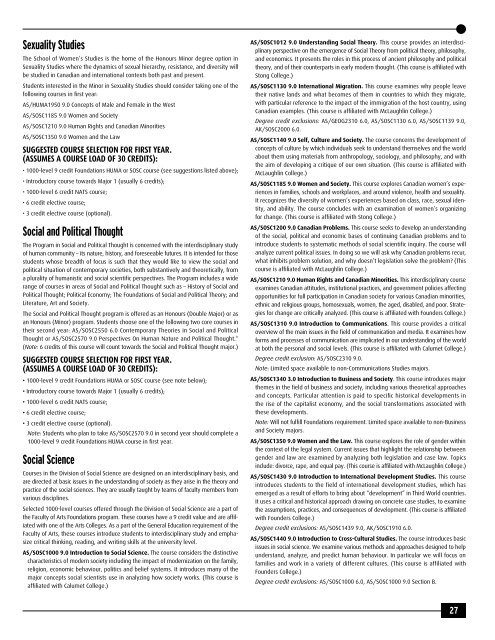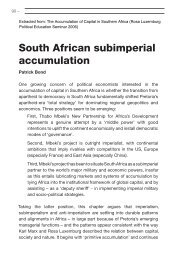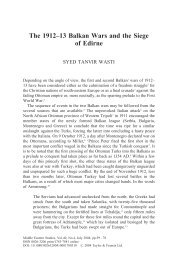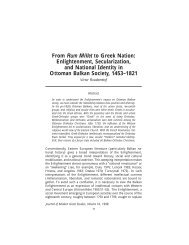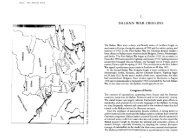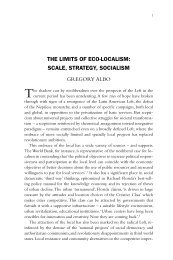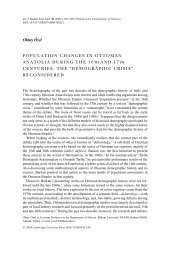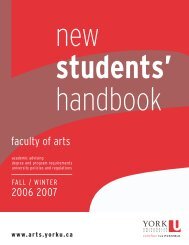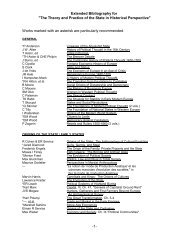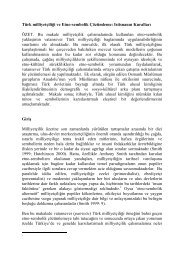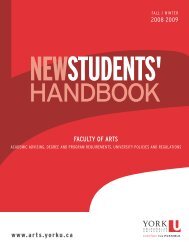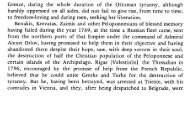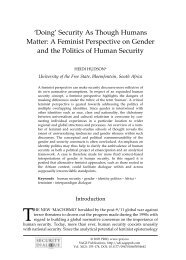FYCSG 05/06 REV2 - Faculty of Arts - York University
FYCSG 05/06 REV2 - Faculty of Arts - York University
FYCSG 05/06 REV2 - Faculty of Arts - York University
You also want an ePaper? Increase the reach of your titles
YUMPU automatically turns print PDFs into web optimized ePapers that Google loves.
Sexuality Studies<br />
The School <strong>of</strong> Women’s Studies is the home <strong>of</strong> the Honours Minor degree option in<br />
Sexuality Studies where the dynamics <strong>of</strong> sexual hierarchy, resistance, and diversity will<br />
be studied in Canadian and international contexts both past and present.<br />
Students interested in the Minor in Sexuality Studies should consider taking one <strong>of</strong> the<br />
following courses in first year:<br />
AS/HUMA1950 9.0 Concepts <strong>of</strong> Male and Female in the West<br />
AS/SOSC1185 9.0 Women and Society<br />
AS/SOSC1210 9.0 Human Rights and Canadian Minorities<br />
AS/SOSC1350 9.0 Women and the Law<br />
SUGGESTED COURSE SELECTION FOR FIRST YEAR.<br />
(ASSUMES A COURSE LOAD OF 30 CREDITS):<br />
• 1000-level 9 credit Foundations HUMA or SOSC course (see suggestions listed above);<br />
• Introductory course towards Major 1 (usually 6 credits);<br />
• 1000-level 6 credit NATS course;<br />
• 6 credit elective course;<br />
• 3 credit elective course (optional).<br />
Social and Political Thought<br />
The Program in Social and Political Thought is concerned with the interdisciplinary study<br />
<strong>of</strong> human community – its nature, history, and foreseeable futures. It is intended for those<br />
students whose breadth <strong>of</strong> focus is such that they would like to view the social and<br />
political situation <strong>of</strong> contemporary societies, both substantively and theoretically, from<br />
a plurality <strong>of</strong> humanistic and social scientific perspectives. The Program includes a wide<br />
range <strong>of</strong> courses in areas <strong>of</strong> Social and Political Thought such as – History <strong>of</strong> Social and<br />
Political Thought; Political Economy; The Foundations <strong>of</strong> Social and Political Theory; and<br />
Literature, Art and Society.<br />
The Social and Political Thought program is <strong>of</strong>fered as an Honours (Double Major) or as<br />
an Honours (Minor) program. Students choose one <strong>of</strong> the following two core courses in<br />
their second year: AS/SOSC2550 6.0 Contemporary Theories in Social and Political<br />
Thought or AS/SOSC2570 9.0 Perspectives On Human Nature and Political Thought.*<br />
(Note: 6 credits <strong>of</strong> this course will count towards the Social and Political Thought major.)<br />
SUGGESTED COURSE SELECTION FOR FIRST YEAR.<br />
(ASSUMES A COURSE LOAD OF 30 CREDITS):<br />
• 1000-level 9 credit Foundations HUMA or SOSC course (see note below);<br />
• Introductory course towards Major 1 (usually 6 credits);<br />
• 1000-level 6 credit NATS course;<br />
• 6 credit elective course;<br />
• 3 credit elective course (optional).<br />
Note: Students who plan to take AS/SOSC2570 9.0 in second year should complete a<br />
1000-level 9 credit Foundations HUMA course in first year.<br />
Social Science<br />
Courses in the Division <strong>of</strong> Social Science are designed on an interdisciplinary basis, and<br />
are directed at basic issues in the understanding <strong>of</strong> society as they arise in the theory and<br />
practice <strong>of</strong> the social sciences. They are usually taught by teams <strong>of</strong> faculty members from<br />
various disciplines.<br />
Selected 1000-level courses <strong>of</strong>fered through the Division <strong>of</strong> Social Science are a part <strong>of</strong><br />
the <strong>Faculty</strong> <strong>of</strong> <strong>Arts</strong> Foundations program. These courses have a 9 credit value and are affiliated<br />
with one <strong>of</strong> the <strong>Arts</strong> Colleges. As a part <strong>of</strong> the General Education requirement <strong>of</strong> the<br />
<strong>Faculty</strong> <strong>of</strong> <strong>Arts</strong>, these courses introduce students to interdisciplinary study and emphasize<br />
critical thinking, reading, and writing skills at the university level.<br />
AS/SOSC1000 9.0 Introduction to Social Science. The course considers the distinctive<br />
characteristics <strong>of</strong> modern society including the impact <strong>of</strong> modernization on the family,<br />
religion, economic behaviour, politics and belief systems. It introduces many <strong>of</strong> the<br />
major concepts social scientists use in analyzing how society works. (This course is<br />
affiliated with Calumet College.)<br />
AS/SOSC1012 9.0 Understanding Social Theory. This course provides an interdisciplinary<br />
perspective on the emergence <strong>of</strong> Social Theory from political theory, philosophy,<br />
and economics. It presents the roles in this process <strong>of</strong> ancient philosophy and political<br />
theory, and <strong>of</strong> their counterparts in early modern thought. (This course is affiliated with<br />
Stong College.)<br />
AS/SOSC1130 9.0 International Migration. This course examines why people leave<br />
their native lands and what becomes <strong>of</strong> them in countries to which they migrate,<br />
with particular reference to the impact <strong>of</strong> the immigration <strong>of</strong> the host country, using<br />
Canadian examples. (This course is affiliated with McLaughlin College.)<br />
Degree credit exclusions: AS/GEOG2310 6.0, AS/SOSC1130 6.0, AS/SOSC1139 9.0,<br />
AK/SOSC2000 6.0.<br />
AS/SOSC1140 9.0 Self, Culture and Society. The course concerns the development <strong>of</strong><br />
concepts <strong>of</strong> culture by which individuals seek to understand themselves and the world<br />
about them using materials from anthropology, sociology, and philosophy, and with<br />
the aim <strong>of</strong> developing a critique <strong>of</strong> our own situation. (This course is affiliated with<br />
McLaughlin College.)<br />
AS/SOSC1185 9.0 Women and Society. This course explores Canadian women’s experiences<br />
in families, schools and workplaces, and around violence, health and sexuality.<br />
It recognizes the diversity <strong>of</strong> women’s experiences based on class, race, sexual identity,<br />
and ability. The course concludes with an examination <strong>of</strong> women’s organizing<br />
for change. (This course is affiliated with Stong College.)<br />
AS/SOSC1200 9.0 Canadian Problems. This course seeks to develop an understanding<br />
<strong>of</strong> the social, political and economic bases <strong>of</strong> continuing Canadian problems and to<br />
introduce students to systematic methods <strong>of</strong> social scientific inquiry. The course will<br />
analyze current political issues. In doing so we will ask why Canadian problems recur,<br />
what inhibits problem solution, and why doesn’t legislation solve the problem? (This<br />
course is affiliated with McLaughlin College.)<br />
AS/SOSC1210 9.0 Human Rights and Canadian Minorities. This interdisciplinary course<br />
examines Canadian attitudes, institutional practices, and government policies affecting<br />
opportunities for full participation in Canadian society for various Canadian minorities,<br />
ethnic and religious groups, homosexuals, women, the aged, disabled, and poor. Strategies<br />
for change are critically analyzed. (This course is affiliated with Founders College.)<br />
AS/SOSC1310 9.0 Introduction to Communications. This course provides a critical<br />
overview <strong>of</strong> the main issues in the field <strong>of</strong> communication and media. It examines how<br />
forms and processes <strong>of</strong> communication are implicated in our understanding <strong>of</strong> the world<br />
at both the personal and social levels. (This course is affiliated with Calumet College.)<br />
Degree credit exclusion: AS/SOSC2310 9.0.<br />
Note: Limited space available to non-Communications Studies majors.<br />
AS/SOSC1340 3.0 Introduction to Business and Society. This course introduces major<br />
themes in the field <strong>of</strong> business and society, including various theoretical approaches<br />
and concepts. Particular attention is paid to specific historical developments in<br />
the rise <strong>of</strong> the capitalist economy, and the social transformations associated with<br />
these developments.<br />
Note: Will not fulfill Foundations requirement. Limited space available to non-Business<br />
and Society majors.<br />
AS/SOSC1350 9.0 Women and the Law. This course explores the role <strong>of</strong> gender within<br />
the context <strong>of</strong> the legal system. Current issues that highlight the relationship between<br />
gender and law are examined by analyzing both legislation and case law. Topics<br />
include: divorce, rape, and equal pay. (This course is affiliated with McLaughlin College.)<br />
AS/SOSC1430 9.0 Introduction to International Development Studies. This course<br />
introduces students to the field <strong>of</strong> international development studies, which has<br />
emerged as a result <strong>of</strong> efforts to bring about “development” in Third World countries.<br />
It uses a critical and historical approach drawing on concrete case studies, to examine<br />
the assumptions, practices, and consequences <strong>of</strong> development. (This course is affiliated<br />
with Founders College.)<br />
Degree credit exclusions: AS/SOSC1439 9.0, AK/SOSC1910 6.0.<br />
AS/SOSC1440 9.0 Introduction to Cross-Cultural Studies. The course introduces basic<br />
issues in social science. We examine various methods and approaches designed to help<br />
understand, analyze, and predict human behaviour. In particular we will focus on<br />
families and work in a variety <strong>of</strong> different cultures. (This course is affiliated with<br />
Founders College.)<br />
Degree credit exclusions: AS/SOSC1000 6.0, AS/SOSC1000 9.0 Section B.<br />
27


